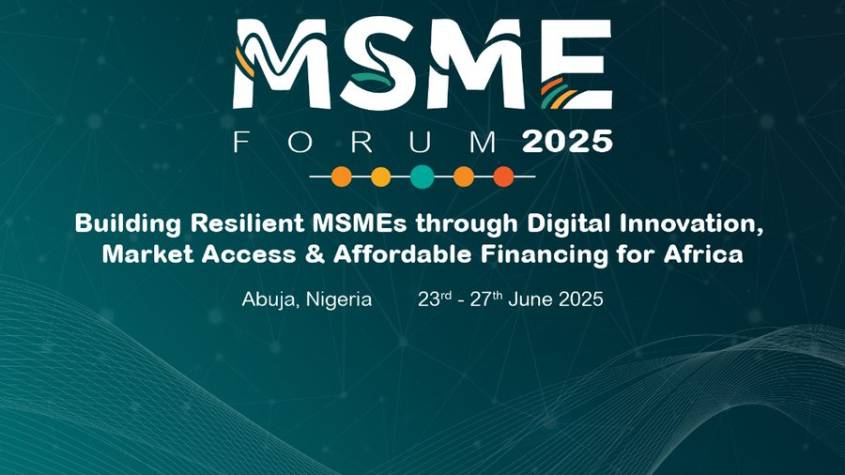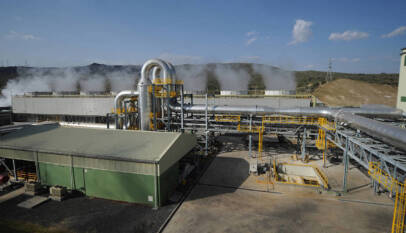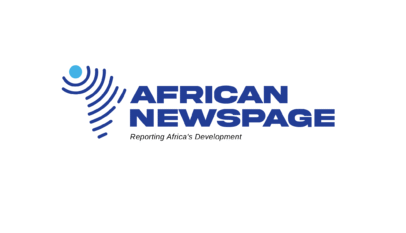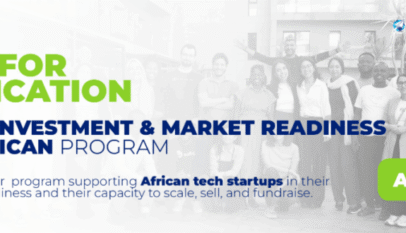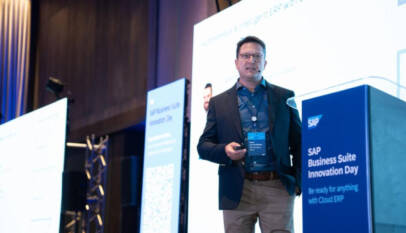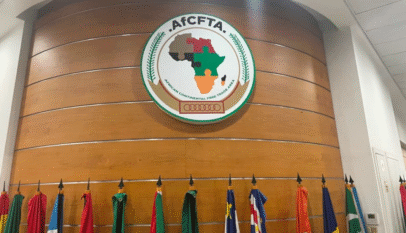4th AU MSME Forum: Unlocking Market Opportunities for African MSMEs
The 4th Annual African Union Micro, Small, and Medium-Sized Enterprises (MSME) Forum took place in Abuja, Nigeria, from June 23 to 27, 2025, with a central focus on advancing digital transformation and expanding market access for MSMEs across the continent.
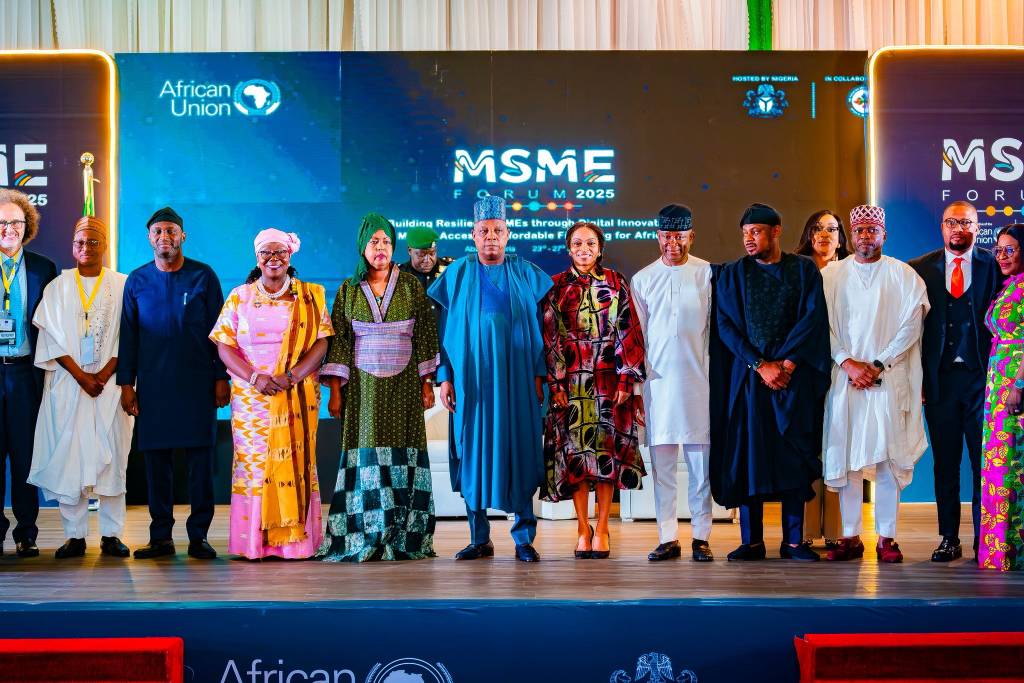
In 2013, during its 20th Ordinary Session, the African Union’s Conference of African Ministers of Industry (CAMI 20) called on Member States to create enabling environments for the growth of Small and Medium Enterprises (SMEs). This appeal recognized the pivotal role that private sector development—particularly the growth of SMEs—plays in driving sustainable economic development across Africa.
To this end, the African Union has developed an SME Development Strategy and Action Plan, which emphasizes empowering SMEs to drive the creation of intra-African value chains and strengthen regional trade. The strategy aims to foster competitive, diversified, and sustainable economies, anchored by dynamic entrepreneurial and industrial sectors. Ultimately, it seeks to create employment opportunities, reduce poverty, and promote greater social inclusion.
To support the effective implementation of the strategy, the Integrated Program Delivery Framework proposed the establishment of an annual African Union Micro, Small, and Medium-Sized Enterprises (MSME) Forum. The Forum serves as a vital platform for knowledge exchange, policy dialogue, and collaboration on MSME development across the continent, helping to align efforts, share best practices, and accelerate inclusive economic growth in Africa.
The AU MSME Forum has emerged as a pivotal platform for fostering economic growth, job creation, and Africa’s sustainable development. Building on the successes of previous forums, including the maiden edition held in Cairo (2022); the second edition held in Addis Ababa (2023), and the third edition held in Windhoek (2024), the Forum has become the premier platform for dialogue between policymakers, development partners, and entrepreneurs on SME development in Africa.
Against this backdrop, the 4th AU MSME Forum was hosted in Abuja, Nigeria in collaboration with the Government of Nigeria. It was an interactive platform for policymakers, investors, and stakeholders from across the continent. The Forum centered on two pivotal themes: enhancing digital transformation and improving market access for MSMEs. Over five days, participants explored practical strategies for leveraging digital technologies to improve MSMEs’ operational efficiency, market reach, and competitiveness.
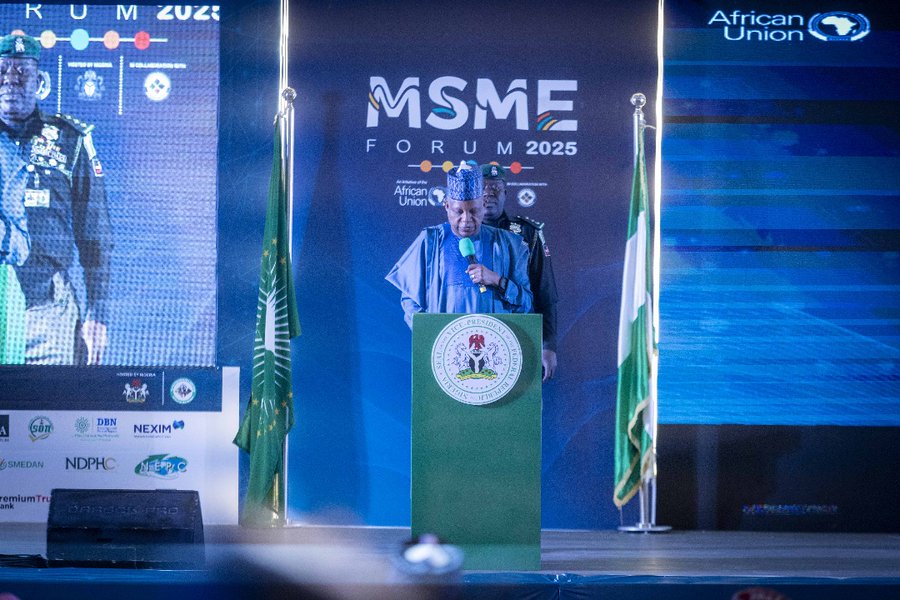
“There’ll be No African Prosperity without a Strong MSME Ecosystem” – Nigerian VP
In his keynote, Senator Kashim Shettima, Vice President of Nigeria, underscored that Africa’s economic future hinges on unlocking the vast potential of the informal sector, which comprises nearly 90% of the continent’s workforce. He emphasized that meaningful integration of this sector into formal intra-African trade—particularly through the African Continental Free Trade Area (AfCFTA)—is critical to achieving sustainable economic growth and regional prosperity.
The Nigerian Vice President cautioned that Africa risks remaining trapped in a cycle of economic stagnation if it fails to harness the potential of its informal sector to support small business growth. He stressed the urgent need to integrate the informal economy into the structure of formal intra-African trade, particularly through frameworks like the AfCFTA, noting that this imperative is why small businesses continue to occupy a central place in Nigeria’s policy formulation agenda.
“There can be no African prosperity without a strong MSME ecosystem. This Forum is a continental call to action. We owe it to ourselves, to our children, and to generations unborn, to integrate our informal economy into the framework of formal intra-African trade. I am confident that through our collaborative efforts, this Forum will mark a turning point. We hope to see our shared aspirations translated into concrete actions that empower our MSMEs and propel Africa towards a brighter, more sustainable future,” VP Shettima told the Forum.
VP Shettima underscored the importance of creating a supportive financial ecosystem for MSMEs, calling on banks to implement strong credit guarantee schemes, adopt blended finance models, and foster regulatory frameworks that promote innovation while protecting consumers. He emphasized that these steps are crucial to making MSMEs bankable and ensuring their full inclusion in local markets, rather than being sidelined.
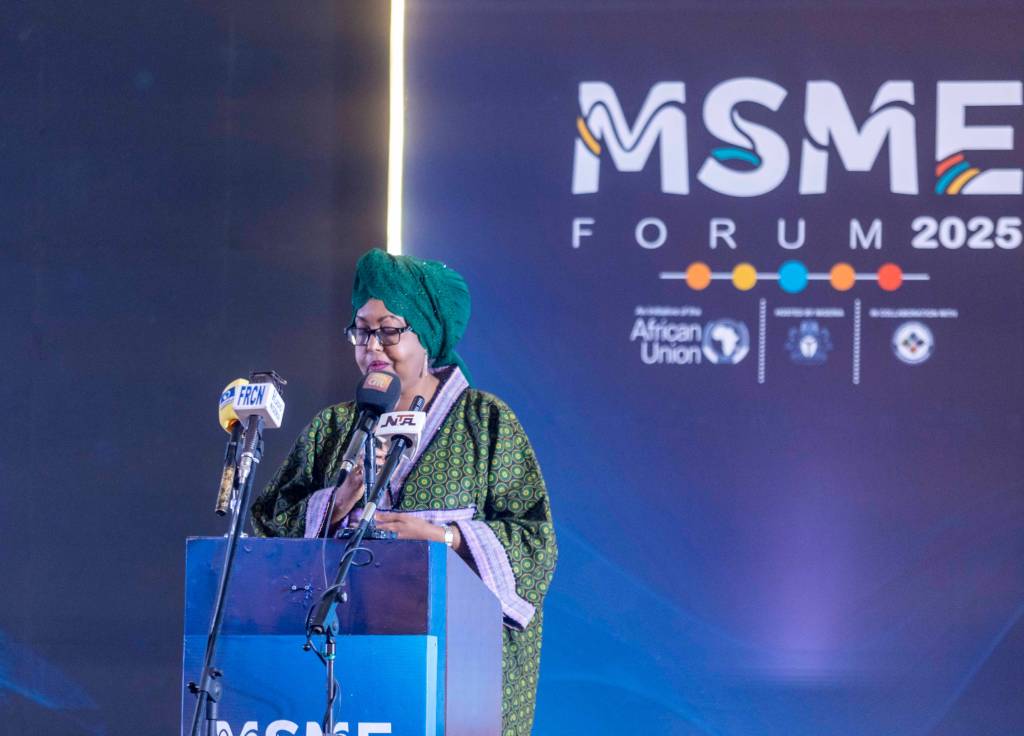
“Single-digit Interest for MSMEs Crucial for SMEs to Thrive” –AU Commissioner
In her opening remarks, Mrs. Ron Osman Omar, Director of Industry, Minerals, Entrepreneurship and Tourism at the African Union Commission, speaking on behalf of Moses Vilakati, Acting Commissioner for Economic Development, Trade, Tourism, Industry, and Minerals (ETTIM), emphasized that MSMEs remain the backbone of Africa’s industrial and economic landscape.
“The forum remains a pivotal platform for promoting economic growth, job creation and sustainable development across the continent. The focus on digital innovation, market access, and affordable financing addresses the pressing need of our SMEs. In the rapidly evolving digital landscape, our MSMEs must embrace digital literacy, e-commerce integration and innovative technology to remain competitive, not just within Africa, but globally. Digital innovation is no longer a luxury, but in necessity for African MSMEs,” Mrs Omar said.
The Director noted that SMEs drive job creation, innovation, and production, critical elements for realizing Agenda 2063. MSMEs, she said, contribute approximately 40% to Africa’s GDP and generate about 80% of employment across the continent. She called for a single-digit interest rate for MSMEs to create an enabling environment where small businesses can thrive and contribute meaningfully to Africa’s economic transformation.
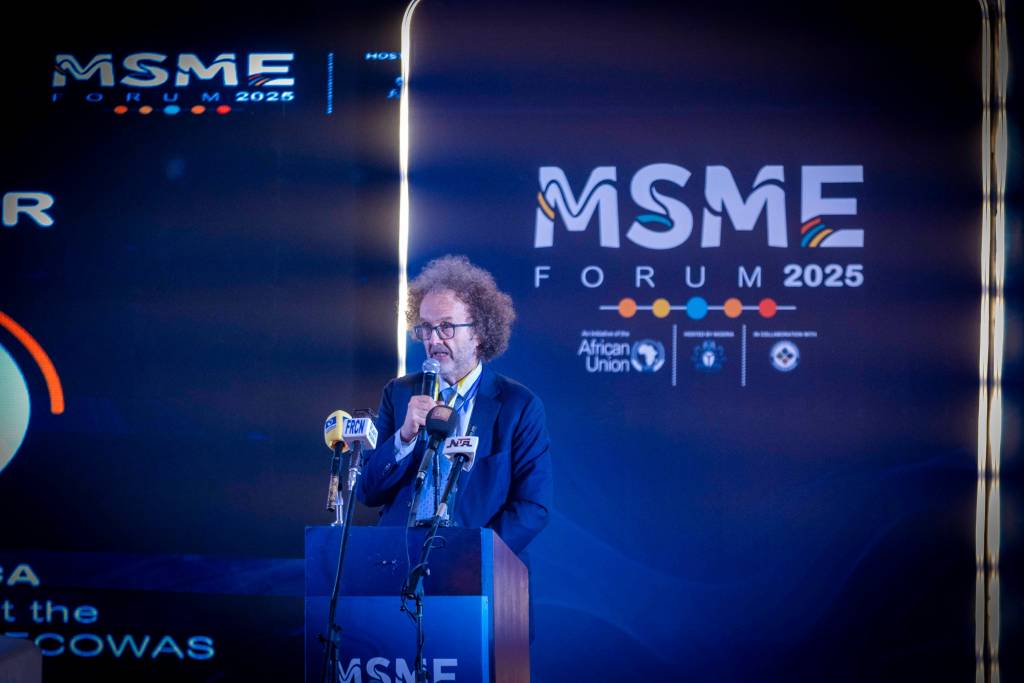
“AU-EU Collaboration Champion Inclusive SMEs Development” – EU Delegation
In his goodwill message, Mr. Massimo De Luca, Head of Cooperation at the European Union Delegation to Nigeria and ECOWAS, reaffirmed the EU’s strong emphasis on private sector development as a cornerstone for achieving the Sustainable Development Goals (SDGs). He underscored the EU’s firm commitment to inclusive development, highlighting the critical role of meaningful private sector participation, particularly that of MSMEs, in driving sustainable growth and prosperity across Africa.
“They [SMEs] are indispensable in achieving a sustained development trajectory that is inclusive, resilient, sustainable, and transformative. The EU has actively collaborated with the AUC to champion the inclusive and sustainable development of MSMEs. This is integral to the broader framework of the EU’s partnership with the African Union, where we supported shaping the AU SME Strategy, which emphasises empowering SMEs to develop regional and continental value chains, and bolster intra-African trade in the AfCFTA context,” De Luca said.
The EU representative noted that the EU employs various strategies to support African SMEs, notably through the €1.1 billion Team Europe Initiative for African Economic Integration under the AfCFTA. This initiative targets key areas essential to SME growth and competitiveness—such as value addition, export readiness, marketing, labelling, sustainability, technology transfer, innovation, business development, and compliance with standards and technical regulations— to enhance their access to new markets and drive economic integration.
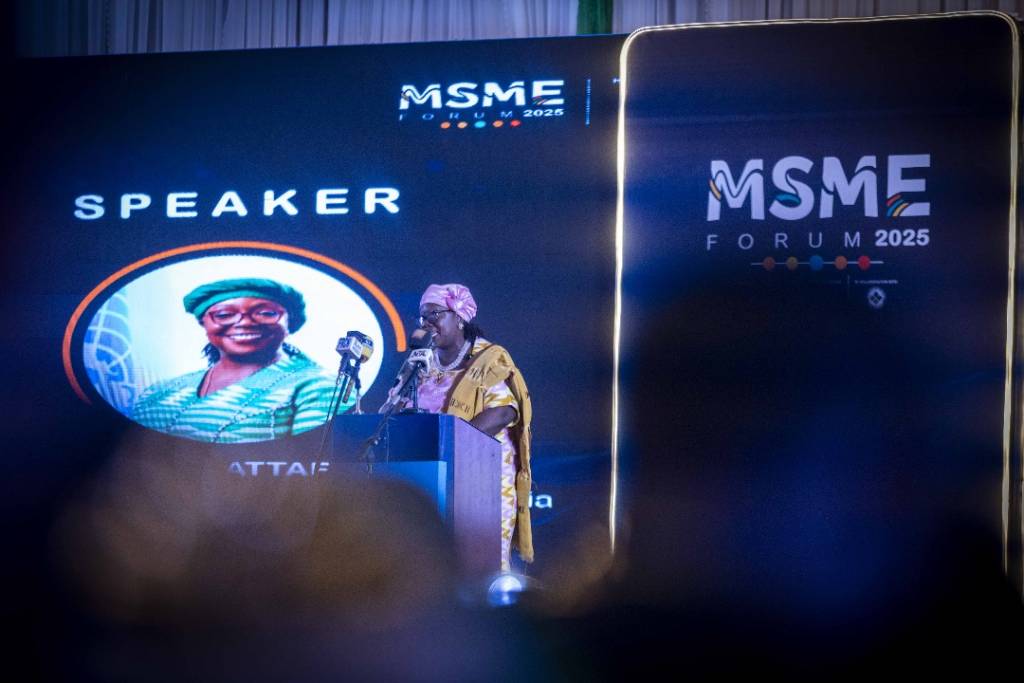
“SMEs Drivers of African Economic Transformation” — UNDP Representative
In her message, Ms. Elsie G. Attafuah, UNDP Resident Representative in Nigeria, speaking on behalf of Ms. Ahunna Eziakonwa, UN Assistant Secretary-General and Regional Director for Africa, affirmed the UNDP’s belief that Africa’s transformation will be driven by the resilience and ingenuity of its MSMEs—especially those led by youth and women—supported by bold and coordinated action across the continent.
“Through Timbuktoo, our flagship $1 billion pan-African innovation initiative, we are laying the foundation for a new startup economy—bold, inclusive, and globally competitive. At the heart of this is a growing network of specialised innovation hubs in cities across Africa. From fintech in Lagos, Greentech in Nairobi, Mining Tech in Lusaka and Health Tech in Kigali, to smart mobility in Casablanca, AgriTech in Accra, and Creative Tech in Cape Town, Timbuktoo is catalysing solutions where Africa’s talent meets Africa’s challenges,” Mrs Attafuah said.
The UNDP Representative emphasized the need for both public and private capital to de-risk and co-invest in women- and youth-led enterprises, stressing that for trade diplomacy to truly benefit small businesses, it must go beyond fostering resilience to enabling scale. She added that Africa’s MSMEs are not merely surviving—they are ready to lead.
The AU MSME Forum has now emerged as a pivotal platform for advancing economic growth, job creation, and sustainable development. Building on the momentum of previous editions, the 4th AU MSME Forum focused on addressing the critical challenges of digital transformation and market access for African MSMEs. As the backbone of Africa’s economy, MSMEs continue to face structural barriers in adopting digital technologies and expanding into broader markets, which are essential for enhancing their growth, competitiveness, and long-term resilience.

